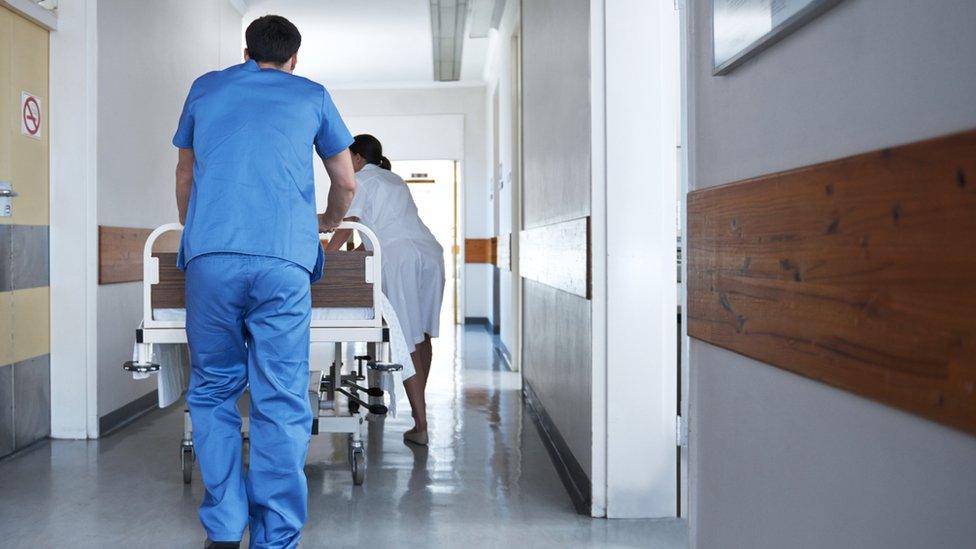Welsh government budget: What does it mean for me?
- Published
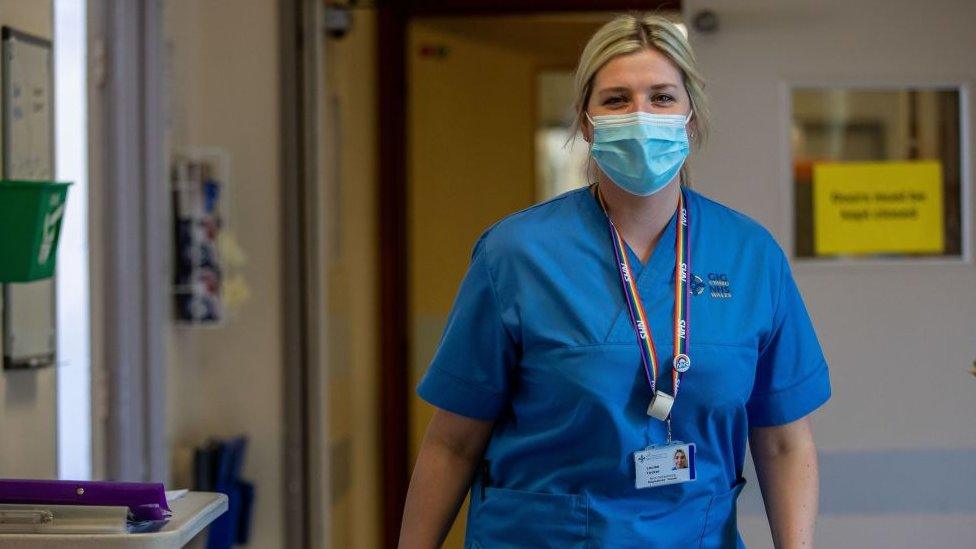
Nurses are set to go on strike this week amid demands for a pay rise
Public services face a "perfect storm of financial pressures", the Welsh government said as it unveiled its spending plans for next year.
Finance Minister Rebecca Evans said her £20bn budget would top up NHS funding and help vulnerable people through the cost of living crisis.
But ministers have ruled out raising income tax, despite calls from Plaid Cymru to use it to bolster pay rises.
There are increases for health and councils.
But there is concern for homelessness support as a grant scheme faces a real terms cut.
Meanwhile, ministers confirmed that winter fuel payments worth £200 for people on benefits would not be offered from April.
There is extra cash from Westminster from the Chancellor's Autumn Statement, but rising costs mean money will not go as far as hoped.
It comes as the Welsh government faces pressure over pay from unions, with nurses set to strike on Thursday.
Labour has said a lack of funding from the UK government makes it unable to offer better pay deals but Mr Drakeford said in October that the case for tax rises would be considered.
The Conservatives said there were questions to answer over how effectively money was being spent by ministers.
More for health and councils - but services face cuts
The Welsh government sets funding for the health service and for councils, who in turn fund social care, schools and refuse collections.
But services could struggle to meet increasing costs - meaning they may face difficult choices and potential cuts.
One question is whether the NHS can clear its large post-pandemic waiting lists with the money.
In its announcement it said an extra £165m was allocated for NHS Wales to help protect frontline services.
Overall the health and social services spending will increase by 6.31% to £10.9bn - less than the consumer price index inflation rate of 11.1%.
It comes amid demands for pay rises to meet the cost of living, with members of the Royal College of Nursing (RCN) walking out on Thursday.
RCN Wales director Helen Whyley said: "The Welsh government have no intention of offering a resolution and the draft budget today only confirms that."
An extra £227m was provided to councils - which includes cash for schools. Head teaching union NAHT Cymru warned it was not enough to solve the funding crisis in schools.
In total spending on local government and finance will rise by 5.95% to £6bn.
There is no extra money for Natural Resources Wales, which sees its budget stay at £60.1m, while ministers also said they are "unable" to help the heritage and culture organisations that it supports meet the pressures of inflation.
Will there be help with the cost of living?

A £90m Welsh government scheme to help people on benefits pay their energy bills will not return next year.
Citing financial pressures, ministers said the £200 winter fuel support scheme was only intended to run for two years, and would not be extended to 2023-24.
However it said it would put an extra £18.8m into its discretionary assistance fund, external, which provides help for people who find themselves in financial hardship.
Will there be income tax rises?

The Welsh government confirmed it will not use its income tax powers in Tuesday's budget.
At question time in the Senedd First Minister Mark Drakeford rejected the idea in an exchange with Welsh Conservative Senedd leader Andrew RT Davies.
He said people in Wales were paying more tax than at any time in the past 70 years as a result of UK government decisions.
Raising taxes still further was "an astonishing suggestion for him to make", he told Mr Davies.
"At a time when people cannot buy food and they cannot afford to pay for energy that we should take even more money out of their pockets than his government is taking already?
"That is not a choice a serious government would make here in Wales."
Even if taxes were hiked, it would not come "anywhere near" to raising enough money for pay deals that match the rate of inflation, Mr Drakeford added.


In the season of goodwill, there's little to cheer about in this budget.
The outlook for household incomes is "alarmingly bleak", it says.
In those circumstances, perhaps it isn't surprising that Mark Drakeford dismissed the idea of an income tax rise in such stark terms today, even though he and his finance minister didn't rule it out in recent weeks.
Money is tight and the Welsh government faces calls for better pay deals in the public sector.
An extra penny on all three income tax bands would have raised around £275m next year, but in the end the government decided it wasn't worth the cost of heaping that pain on hard-pressed households.

Living wage for carers and business rate relief
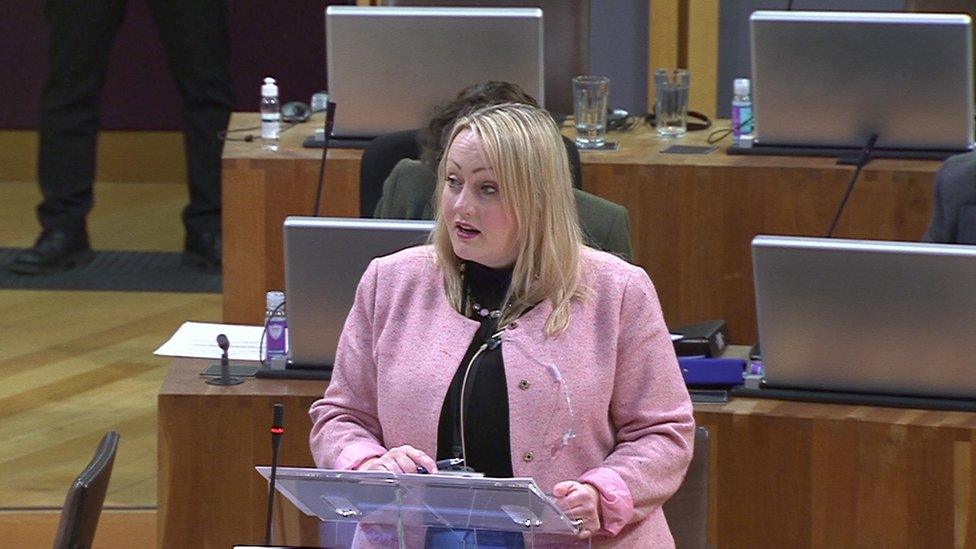
Finance Minister Rebecca Evans unveiled the Welsh government's budget in the Senedd on Tuesday afternoon
With a recession looming, shops, hospitality and leisure venues have been promised a cut in their business rates.
Unveiling her budget, Ms Evans said she would channel money through councils to fund schools and meet a commitment to improve the pay of social carers, meeting a manifesto commitment.
Pay would be raised to the Real Living Wage rate of £10.90 by next June.
Ms Evans said: "This is a budget in hard times, which will help to protect frontline public services as far as we can in the face of a perfect storm of financial pressures, while also providing some extra help to those most affected by the cost-of-living crisis and supporting our economy through the recession."
The Housing Support Grant, used to support homelessness and housing support providers, will stay at £166.7m with no increase.
Katie Dalton, director of Cymorth Cymru, which represents housing charities and providers, says: "A cash flat budget is a real terms cut, and there is a risk that service delivery becomes unaffordable with the impact of inflation and high energy costs."
The Welsh government said it had added £10m to its homelessness prevention budget.
What about councils?
Lots of public services in Wales - like social care and bin collection - are actually run by local authorities.
They are independent bodies from the Welsh government but they get most of their funding from Labour ministers by them and also raise their own funds in council tax.
If they cannot make ends meet they might have to cut services and hike council tax.
Newport council is already reported to be considering a 9.5% council tax rise, external.
Before the budget the leader of the Welsh Local Government Association, Andrew Morgan, warned next year would be "particularly challenging".
He said his own council, Rhondda Cynon Taf (RCT), had a gap between the money it spends and the money it receives "in the range of £48m, that's around double what it has been in any year of austerity".
"It's not just local government saying this - every year it gets worse. Next year is by far the worst budget gap I've ever seen in RCT in my time."
What do opposition parties say?
Welsh Conservative finance spokesman Peter Fox said there were "serious questions to be asked about whether the money being spent in successive budgets is actually delivering what is expected, with results in health, education and the economy sorely lacking".
"What the people of Wales expect to see from the Labour government is funding being used in a way that finally tackles the long-standing issues that we face in Wales, as well as responding to the issues that we currently endure."
Plaid Cymru leader Adam Price said his party would "continue to make the case" that raising income taxes "should be seriously considered within the context of future budgetary decisions".
"While we acknowledge the sensitivities involved in raising taxes, especially during a cost-of-living crisis, the Welsh government should be prepared to take bold and radical steps to prop up our vital public services."
Welsh Liberal Democrat leader Jane Dodds welcomed "some of the progress made today on health and social care" but was "concerned that what has been announced won't go far enough to stem the tide of people leaving both professions and we have yet to see any breakdown on how this fund would be spent".
"Likewise, I cannot see any proposals in this budget that will make a significant dent in solving the crisis in NHS dentistry."

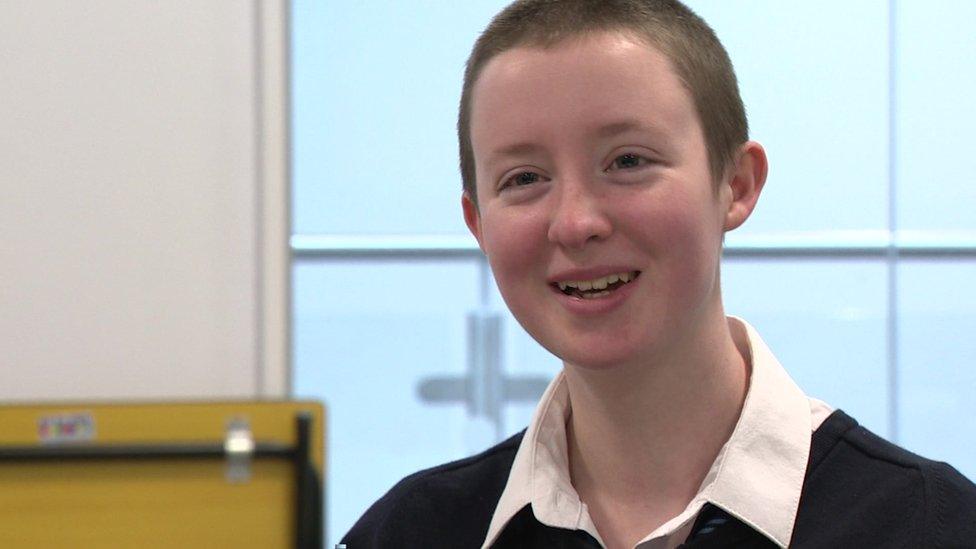
Lorna says most of her family stay in the living room to stay warm
'We have little heaters on'
The budget comes at a time when households across Wales and the rest of the UK are struggling with rising prices.
Lorna, a sixth form pupil at Y Pant School in Pontyclun, said the heating was not on as much as it used to be at home.
"We have little heaters which we put on, but a lot of the time you keep it on for a couple of hours then you leave it and then most of us just stay in the one room, in the living room, and we have blankets and layers and that's how we keep warm a lot of the time.
"When we go out a lot of the time people are looking for the cheapest option for food, we'd go to McDonald's or something like that.
"We don't usually go to places that are too expensive, because nobody can really afford it too much."
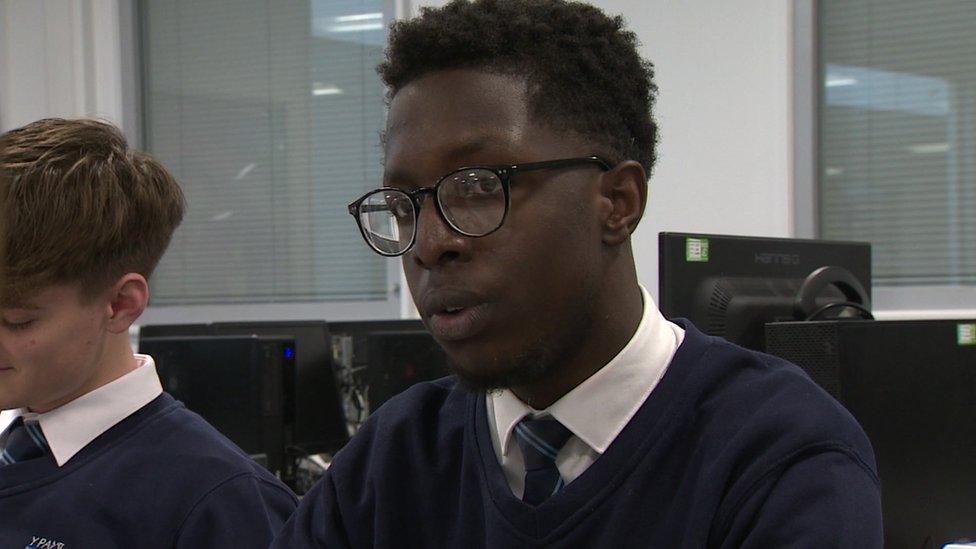
Fidel says the radiators tend to be off at school
For fellow pupil Fidel it is a similar story.
"At home it's just normally keeping less lights on, the heating is off, the thermostats are lower than usual," he said.
"Refrigerators are mostly off because we're trying to use less power.
"In school I've noticed the radiators are mostly off because of the electricity use."

BBC WALES INVESTIGATES: The subjects affecting the lives of people in Wales
BROTHERS IN DANCE: The remarkable duo at the forefront of UK dance

Related topics
- Published17 November 2022
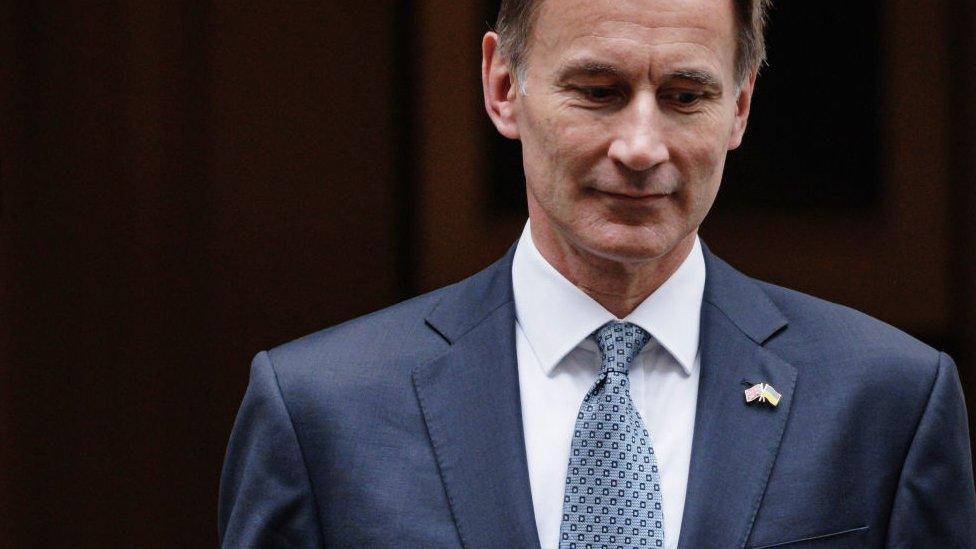
- Published9 December 2022

- Published5 December 2022
